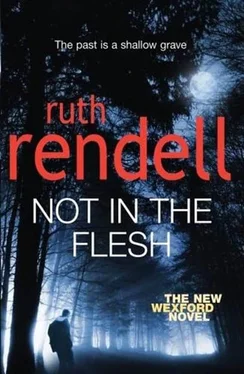“His name may have been Miller. He was called Dusty.”
This time she did ponder on the name. “The Tredowns once had a-well, a handyman they called Dusty. He used to drive their car sometimes too. I never saw him. That Ricardo woman told me.”
“When was this?”
“Oh, my goodness, how you expect me to remember things like this I really don't know.”
“You're doing very well,” he said eagerly.
This seemed to please her. She was susceptible to flattery and she smiled, though this may have been due to the reappearance of Greg with a tray on which was a rolled-up hot towel of the kind they give you in Chinese restaurants, a bottle of violet-scented toilet water, and a tube of hand cream.
“He's so thoughtful,” she said when she had anointed her hands. “I can't imagine now how I got on without him. When was it this Dusty was with them? Oh, at least ten years ago, maybe more like twelve.” She became almost chatty. “Mr. Tredown can drive, but he doesn't. Apparently he once caused an awful accident-someone was killed-and he's never driven since. The Ricardo woman can't and Mrs. Tredown can now, but she hadn't passed her test then. She passed it a year or two before we moved. Ronald said she'd no business being on the road when he heard she'd passed.”
All this was interesting enough, but it seemed of little use to him. The vital contribution Mrs. McNeil had made, perhaps the only contribution of any worth, was that a man called Dusty had worked for the Tredowns. Only they could tell him more now.
“I shall ask you about the knife again,” he said.
She shrugged, made an unusual movement with her hand, an impatient flutter. He was on his way out and Donaldson was waiting when his phone rang. It was Selina Hexham.
He took the call in the car. The answer he expected was a negative one, because now he had less faith in the idea that had come to him in the small hours. Things you think of when you wake in the night often look bizarre or stupid in the morning.
Instead she said, “That would mean the piece of paper with his writing on it makes sense. But I don't know. One small thing, though. It's so small I didn't think it worth putting in my book. I remember a magazine-well, a journal, I suppose you'd call it-lying on a table in our house. It was called The Author. Where it came from I don't know but there were some ads in it from people offering to do research for authors. I don't remember any more except Mum saying that would be a nice job for someone.”
He thanked her and unexpectedly she began to talk about how she'd changed her mind about finding her father's killer. Now she agreed with him. This man should be found, but still she was glad capital punishment had gone forever. Later he wondered how much credence he should put on her remembering The Author and her mother's comment. Would anyone's memory be that good? It was more likely, he thought, that Selina had, perhaps unconsciously, invented it in an effort to help him find the perpetrator of a crime.
They followed her car along the short drive and under the dripping trees. Maeve Tredown wasn't a good driver, uncertain and apparently nervous at the wheel. She came close to scraping the side of the old Volvo against the trunk of a towering conifer and pulled up too sharply outside the front door, setting the car juddering. The curious colors of the house, the jarring yellows and reds, looked brighter when washed by teeming rain. She opened the driver's door and leaned out to see who had come to visit.
“Good morning, Mrs. Tredown,” Wexford said. “Perhaps it would be best if we went straight inside.” He expected some irrational argument, but she got quickly out of the car, slamming the door violently, and let them into the house. “How is your husband?” he asked when they were inside.
“They are taking him into a hospice tomorrow,” she said. “There isn't any hope.” She said it in the kind of cheerful tone she might have used to say there wasn't anything to fear. “I thought a hospice was a place monks lived in with Saint Bernard dogs. But apparently not anymore.”
Wexford could smell the vanilla scent she wore as she led them along the dark passage past the haphazardly hung coats and flung footwear, throwing her raincoat onto a peg as she passed. This time they weren't to be received in the gloomy living room. Instead they went into a kind of farmhouse kitchen where, in front of an open fire, Tredown lay in an armchair with his legs up on the seat of another, pipe in mouth. Blankets covered him, though it was insufferably hot. At the other end of the room, the part where cooking was done, Claudia Ricardo stood in front of an Aga, apparently making lemon curd. The whole place smelled of a mixture of lemons and burning sage.
“I believe it's very hot in here,” Tredown said, removing the pipe without lifting his head. “I'm afraid I always feel cold these days. Perhaps you should take these gentlemen into the drawing room, Em.”
“Please don't worry about the heat, Mr. Tredown,” Wexford said. “We'd like to talk to you as well.”
“You'd better sit down, then.” Maeve Tredown was as offhand as her husband was courteous.
“Would you make us some coffee or tea, Cee?” Tredown apparently thought it safer to make this request of his ex-wife than his present one, or perhaps he only did so because Claudia was already engaged in cooking. She waved a wooden spoon in a gesture of acquiescence. “What did you want to ask me, Mr. Wexford?”
“I believe you once employed a man who went by the name of Dusty.”
Tredown put the pipe down on a saucer and turned his cadaverous yellow face toward Wexford while holding out his hands to the flames. “I forget so many things,” he said. “Let me think. Did we, Em?”
Stony-faced, Maeve Tredown said, “He asked you. Why don't you answer? You know very well we did.”
Speaking very slowly, Tredown said, “I don't believe I ever saw him.” He managed a smile, a death's-head grin. There seemed to be no flesh on his face, only skin stretched over the skull. “I was always working, you see. Upstairs working.”
“You mean writing, Owen. Why don't you say ‘writing?’ ”
“Because it is working. It's what I do.” Wexford couldn't tell if the sound he made was a sigh or an indrawn breath. “What I used to do.”
The unidentifiable warm drink that Claudia Ricardo brought to them in thick earthenware cups was very different from that provided by Mrs. McNeil's Greg. Wexford couldn't tell if it was tea or coffee and, catching sight of Burden's face, saw that he meant to abandon his. Claudia drank hers with apparent pleasure, set down her cup with a loud rattle in its saucer, and said, “I remember Dusty perfectly. He was rather attractive. I really quite fancied him. He was frightfully common, I thought, but I've always liked a bit of rough.”
“Oh, Cee, you are awful,” Maeve spluttered into her cup.
Tredown had closed his eyes, whether in weariness or distaste it was impossible to tell.
“You employed him to drive your car?” Wexford persevered.
“Once or twice,” Claudia replied. “Mostly it was to mend the car. Poor old car hadn't been driven for yonks-is that still a cool expression? Em couldn't drive then. It was-oh, a long time ago. When did you pass your test, Em?”
“December '97,” said Maeve.
“I've never learnt. My head is always in the clouds, you know, and it wouldn't have done. Owen used to drive, I mean he can, but he killed someone in an accident. He turned right without looking and hit someone and the person died. It was while he was married to me, which may have had something to do with it.”
Tredown managed to rear himself up. He managed too a voice loud enough to exhaust him. “Be quiet, Claudia. If you can't talk sense, go away.” Speaking to her in this way had cost him emotional effort as well. Utterly spent, he lay back, sweat standing in beads on his face.
Читать дальше











